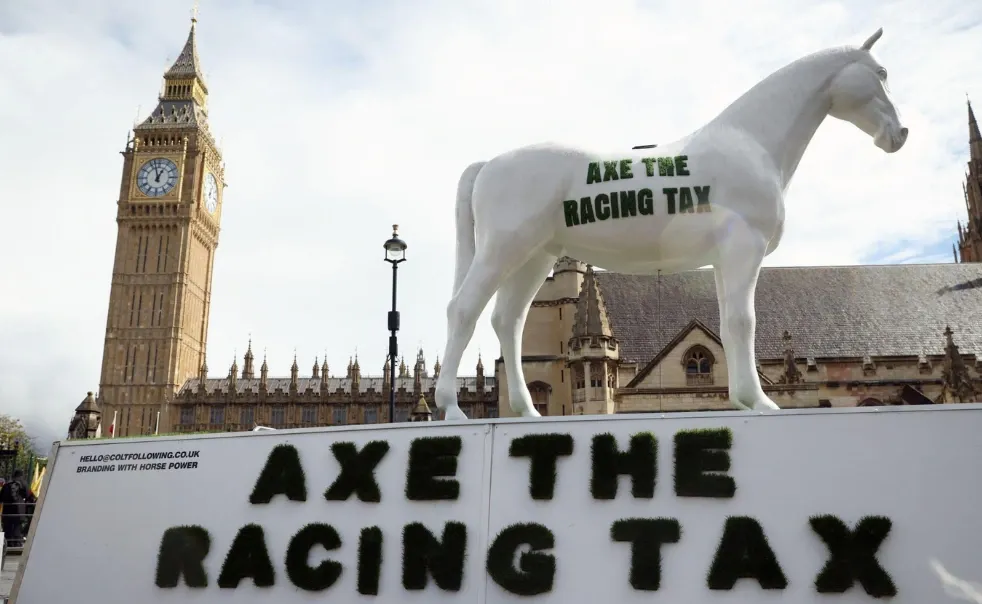British Horse Racing Industry Stages Westminster Protest

Wendz
Sep 19th 2025
Likes
Share:
The British horse racing industry has held an extraordinary demonstration at Westminster to protest against plans by the government to change betting taxes. They cautioned that the sport would face a decrease in money and jobs.
Some of the best jockeys in the world, Hollie Doyle, Tom Marquand, and Oisin Murphy, along with trainers, owners, and racing staff, were outside Parliament to get their worries noticed by MPs. To send a strong message to the MPs, the demonstration took place simultaneously with a one-day strike across the whole country. Generally, British racing has never stopped meetings on its own initiative before, hence this is a historic day.
Participants in Westminster protest wore racing silks emblazoned with the message “Axe The Racing Betting Tax,” provided by the British Horseracing Authority (BHA). A statue of a horse carrying the same slogan was also on display as campaigners called on the Treasury to reconsider its proposal.
Among the people who took part in the Westminster protest, within the context of the sport, the jockeys Paul O’Brien, Saffie Osborne, Kieran Shoemark, Lilly Pinchin, and Richard Johnson, the latter being a former champion rider. By acting as one, they aimed to raise awareness of the enormous ripple effect that might extend from work opportunities, investing, and giving back to local areas through racing.
The Treasury has proposed introducing a single remote betting tax, aligning the current 15% levy on bookmakers with the 21% applied to online gambling, such as digital casinos and slots.
Supporters of racing argue that this move would unfairly penalize a sport already contributing heavily through existing levies, racecourse operations, and its role in sustaining rural economies.
The BHA has issued an economic analysis predicting a revenue in Westminster protest of approximately £330 million in the first year of implementation. It also warned of 2,752 job losses if the changes are enacted without adjustments specific to horse racing tax rules.
Louise Norman, chief executive of the Racehorse Owners Association (ROA), told BBC Radio 5 Live that horse racing tax rules should not be treated in the same bracket as online gambling.
“Racing has always been treated differently and, therefore, should continue to be treated differently because of the wider economic impact that British racing has,” she said.
“This isn’t about a game of chance; it is skillful. There is time, effort, and contribution emotionally and financially across the sport, whether that’s through the trainers, owners, jockeys, staff, and the wider impacting relationships that racecourses have with communities.”
Norman argued that grouping horse racing tax rules with other gambling sectors would lead to unfair consequences for a sport that relies heavily on long-term investment and community participation.
Some politicians voiced support for the racing industry’s concerns. Labour MP Alex Ballinger said he understood the reasons behind the Westminster protest and urged the government to distinguish between betting on horse racing tax rules and more addictive online gambling products.
“I represent a group of MPs who think the opposite should happen. That we should be having more harmful forms of gambling, online casinos, online slots, paying more taxation,” he said.
“Traditional, historic forms like horse racing that contribute to local communities, they should stay about the same.”
His comments to the Westminster protest reflect a growing division in Parliament over whether the government’s approach to harmonizing betting tax rates is appropriate.
The Westminster protest coincided with a coordinated strike across British racecourses. Four fixtures, Lingfield Park, Carlisle, Uttoxeter, and Kempton Park, were rescheduled by the BHA to demonstrate the seriousness of the industry’s stance.
The timing was especially symbolic, as it was only a day before the famous St Leger Festival at Doncaster, an event that has been going on for a long time and is one of the most celebrated occasions in the racing calendar.
The industry, by not holding its own scheduled meeting, indicated the extent of its resistance to the proposed betting tax and also its possible disturbance if the warnings are not taken into consideration.
The Treasury, on the other hand, is firm in its stand that an equal playing field for the different sectors would be the fairest way to go, hence the alignment of betting tax rates, but the racing industry is still uncompromising. Those involved in the campaign say that unless the peculiarities of the sector are taken into account, the future of racing could be endangered, particularly that of small trainers, stable staff, and the localities that depend on the sport.
The coming weeks will be significant as discussions continue between the government, MPs, and racing authorities. With the strike marking a turning point in how the sport expresses its concerns, many within the industry believe this Westminster protest has set the tone for an ongoing campaign.
Whether the Treasury revises its plans will be closely watched, not only by those directly involved in racing but also by communities that benefit from the sport’s long-standing economic and cultural presence.
